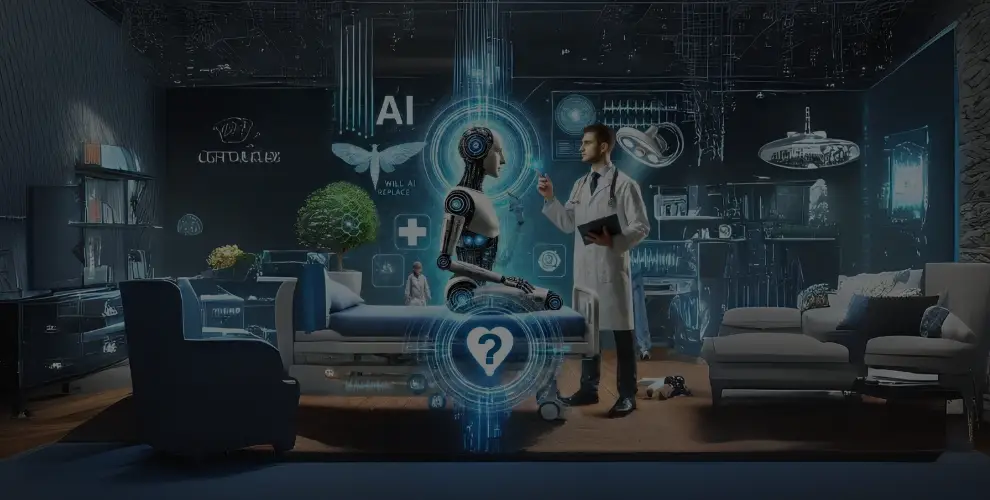
Will Artificial Intelligence Replace Doctors?
Table of Contents
Introduction
Welcome to WikiGlitz!
Today, we’re tackling a big question: Will artificial intelligence replace doctors in diagnosing and treating patients?
With the rise of AI, many people are wondering if doctors will be replaced by machines. AI is already helping in areas like diagnosing illnesses, predicting diseases, and even assisting in surgeries.
But will it ever fully take over from human doctors, or will it always work alongside them?
Key Takeaways
- AI can help make healthcare more accurate and efficient, but it cannot replace human empathy or judgment.
- AI is already being used to help with diagnosing illnesses, guiding surgeries, and managing patient care, but it works with doctors instead of replacing them.
- The future of healthcare will likely involve AI working closely with doctors, combining the speed of machines with the experience of human professionals.
Can AI Replace Doctors in Diagnosing Patients?
The simple answer is no—AI won’t completely replace doctors when it comes to diagnosing patients.
AI is very good at tasks like analyzing medical scans, predicting diseases, and suggesting treatments, but it doesn’t have the ability to understand patients emotionally or make decisions based on ethical concerns.
AI tools like IBM Watson Health and Google’s DeepMind are already helping doctors diagnose diseases by quickly sorting through huge amounts of medical data.
According to Harvard Medical School, AI has sometimes been more accurate than human doctors in spotting skin cancer, but it still needs a doctor’s final judgment.
How AI Helps Doctors in Healthcare
AI is helping doctors in many ways. For example, it can quickly analyze large amounts of information, like medical scans or patient records, and spot problems that might take a human much longer to notice.
AI tools like IBM Watson can also read medical papers and give doctors suggestions about treatments for diseases. Another great example is Google’s DeepMind, which can accurately detect certain eye diseases.
By using AI, doctors can make faster and more informed decisions about patient care.
Will AI Take Over the Healthcare Industry?
AI is changing healthcare by automating everyday tasks, quickly analyzing patient data, and helping doctors make better decisions.
According to a study by McKinsey, AI could make hospitals more efficient by 40%. However, AI will not take over healthcare completely.
It helps doctors by handling the simpler tasks, while doctors focus on things like understanding patients, making complex decisions, and treating them in person.
AI Models Used in Healthcare
Several AI systems are already helping doctors in important ways:
- IBM Watson Health: This AI helps doctors by reading large amounts of medical data to suggest the best treatments for diseases like cancer.
- Google’s DeepMind: DeepMind’s AI is used to help doctors diagnose eye diseases and other conditions by analyzing medical scans.
- PathAI: PathAI helps doctors find signs of diseases like cancer by analyzing tissue samples and medical images.
These AI systems help doctors make better decisions by quickly processing information and suggesting treatment options. But they still need doctors to oversee the final care of patients.
Can AI Be Better Than Doctors at Surgery?
AI systems like the Da Vinci surgical robot are already helping surgeons perform surgeries with more precision.
These robots allow surgeons to make smaller cuts and perform surgeries that require a high level of accuracy. According to the Journal of Surgical Robotics, AI-assisted surgeries can help patients recover 30% faster.
However, AI cannot fully replace human surgeons because they are still the ones in control during surgery. Doctors are the ones making decisions in real-time, especially if something unexpected happens during the operation.
How Will AI Affect Healthcare Jobs?
AI will change some jobs in healthcare, but it won’t replace human professionals. According to the World Economic Forum, AI could change or create up to 85 million jobs by 2025.
Many of these jobs will involve AI helping doctors and nurses by handling repetitive tasks, allowing healthcare professionals to focus on patient care. Jobs that require skills like empathy and complex problem-solving will still need humans.
Future of AI in Healthcare
AI has a bright future in healthcare. It will likely take on more responsibilities like diagnosing diseases, suggesting treatments, and even managing hospitals.
According to a report by Deloitte, AI could help the healthcare industry save up to $150 billion by 2026. However, while AI will be doing more in the future, human doctors will still be in charge of patient care, using AI to help them make better decisions.
Conclusion
Thank you for reading this in-depth look at whether artificial intelligence will replace doctors, brought to you by WikiGlitz!
AI is changing healthcare by making it faster and more accurate, but it’s not going to replace human doctors. Instead, AI will work alongside doctors to make sure patients get the best care. For more insights into how AI and other technologies are shaping the future, follow WikiGlitz.
FAQs
Can AI replace doctors?
No, AI helps doctors by analyzing data and diagnosing diseases, but it cannot replace the human touch, empathy, and judgment that doctors provide.
How does AI help doctors in healthcare?
AI helps doctors by quickly looking through large amounts of medical data, spotting diseases, and suggesting treatments. It makes the process faster but still needs doctors to make the final decisions.
What AI systems are used in healthcare?
AI systems like IBM Watson, Google’s DeepMind, and PathAI are used to help doctors diagnose and treat diseases.
Can AI be better than doctors in diagnosing diseases?
In some areas, like medical imaging, AI has been shown to be more accurate than doctors at spotting diseases. However, it still needs to work with doctors to ensure the best care.
Will robots replace surgeons?
No, robots like the Da Vinci system help surgeons perform surgeries with greater precision, but surgeons are still in control and make the important decisions during surgery.
Want to keep up with our blog?
Our most valuable tips right inside your inbox, once per month.
Error: Contact form not found.
WikiGlitz Team
Welcome to WikiGlitz, your ultimate destination for tech insights and innovation. Our expert team is dedicated to delivering free resources and professional advice on various technology topics, including Artificial Intelligence, Cyber Security, Cloud Computing, and more. We strive to empower our readers with up-to-date information and practical guidance, ensuring you stay ahead in the rapidly evolving tech landscape. At WikiGlitz, we are passionate about making complex technology accessible to everyone. Our team of seasoned experts curates content that is both informative and engaging, helping you understand and leverage the latest tech trends. Whether you're a tech enthusiast or a professional, WikiGlitz is your go-to source for reliable, expert-driven content. Join us on this journey to explore and embrace the future of technology.





